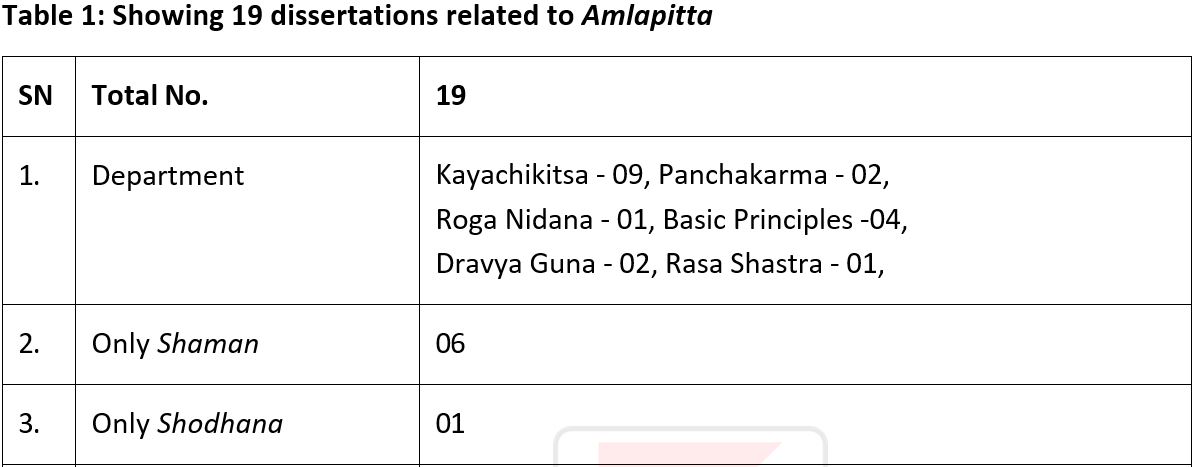A systematic review and analysis of research dissertation on Amlapitta
DOI:
https://doi.org/10.21760/jaims.10.7.36Keywords:
Amlapitta, hyperacidity, Acid peptic disorder, Ayurveda research database, gastritis, hyperchlorhydria, dyspepsia, gastroesophageal reflux disease (GERD)Abstract
Background: Amlapitta, one of the most prevalent disorders of the Annavaha Strotas, is primarily caused by impaired Agni and vitiated Pachaka Pitta, leading to symptoms like Avipaka (indigestion), Amlodgara (sour/bitter belching), Hrid-Kantha Daha (burning sensation in chest and throat), and Aruchi (anorexia). Factors like improper diet, lifestyle habits, stress, and incompatible food combinations contribute significantly to its pathogenesis. Objective: To systematically review various clinical studies and research dissertations exploring the effectiveness of Shodhana and Shamana Chikitsa in the management of Amlapitta. Methods: This review analyzed 19 dissertations from the Ayurvedic Research Database (ARD, 7th Edition, 2001–2018) sourced from various departments like Kayachikitsa, Panchakarma, and Dravyaguna. Studies included both conceptual and clinical approaches, with interventions ranging from classical Ayurvedic formulations to Panchakarma therapies like Virechana. Results: Most studies showed that integrative approaches combining Shodhana and Shamana Chikitsa yielded more significant symptomatic relief than standalone treatments. However, there was a lack of standardized modern diagnostic tools and uniform methodologies. Several formulations such as Dashanga Vati, Guduchyadi Ghana Vati, and Avipattikara Churna showed promising results in reducing cardinal symptoms of Amlapitta. Some trials also emphasized the role of Dosha predominance in treatment selection.
Downloads
References
Sharma A, Gujjarwar V, Nimje S. A systematic review on causes and triggers contributing to Amlapitta in contemporary era. J Ayurveda Integr Med Sci.
Patel HC. A clinico-comparative study of Dashang Yoga with and without Shodhan in management of Amlapitta [MD thesis]. A’bad-GAU, Jamnagar; 2007.
Purani RS. A clinical study of Guduchyadi compound in the management of Amlapitta [MD thesis]. GAAC, Ahmedabad, GAU, Jamnagar; 2008.
Kumar J. A comparative clinical study of Amlapitta and its management with Shatpatrayadi Churna tablet and Patoladi Yoga [MD thesis]. IPGT&RA, GAU, Jamnagar; 2009.
Parmar MB. A comparative study of the effect of Bhoonimbadi Ghanvati and Chhinnodbhavadi Ghanvati in the management of Amlapitta [MD thesis]. GAAC, Ahmedabad, GAU, Jamnagar; 2009.
Patil AB. A comparative clinical study of Yavadi Ghana Vati and Guduchyadi Ghana Vati in the management of Amlapitta [MD thesis]. IPGT&RA, GAU, Jamnagar; 2012.
Joshi N. Comparative study of Eladi Churna and Avipattikara Churna in the management of Amlapitta [MD thesis]. GAAC, Ahmedabad, GAU, Jamnagar; 2013.
Patel M. A clinical study on Vasadi Ghanvati and Chhinnodbhavadi Yoga Ghanvati in management of Amlapitta w.s.r. to Hyperacidity [MD thesis]. Govt. Akhandanand Ayurveda College & Hospital, Ahmedabad; 2015.
Paghdar MP. A clinical study of Guduchyadi Churna and Eladi Churna in the management of Amlapitta [MD thesis]. Govt. Akhandanand Ayurved College, Ahmedabad; 2018.
Gautam SJ. Clinical study on the role of Virechana and Bhoonimbadi Vati in the management of Urdhvaga Amlapitta [MD thesis]. IPGT&RA, Jamnagar; 2004.
Handa AK. A clinical study of Virechana Karma in management of Amlapitta [MD thesis]. J.S. Ayurveda Mahavidyalaya, Nadiad; GAU, Jamnagar; 2018.
Srikrishna CH. Etiopathological study of Amlapitta and its management with Chinnodbhavadi Yoga Ghanvati [MD thesis]. IPGT&RA, Jamnagar; 2008.
Kaka V. Applied concept of Āmapitta and Sāmapitta w.s.r. to Amlapitta [MD thesis]. IPGT&RA, GAU, Jamnagar; 2006.
Bhatt AM. A comparative pharmaceutico-clinical study of Pravala Pishti and Pravala Bhasma in special reference to management of hyperacidity [MD thesis]. IPGT&RA, Jamnagar; 2003.
Iyer SH. Concept of Bhaishajya Kaala and its applicability in relation to Agni w.s.r. to Amlapitta [MD thesis]. PGT&RA, Jamnagar; 2003.
Pol HS. The concept of Drava Guna and its role in physiopathology w.s.r. to Amlapitta [MD thesis]. IPGT&RA, GAU, Jamnagar; 2010.
Trivedi PR. Interrelationship of Prakriti, diet and lifestyle w.s.r. to Amlapitta [MD thesis]. IPGT&RA, GAU, Jamnagar; 2013.
Sahu S. A phytochemical and pharmacotherapeutic study of Patola (Trichosanthes dioica, Roxb.) in the management of Amlapitta [MD thesis]. IPGT&RA, Jamnagar, Gujarat; 2004.
Prajapati SM. A comparative evaluation of pharmacotherapeutic activities of Taverniera nummularia Baker (Jethimala) and Glycyrrhiza glabra Linn (Yashtimadhu) in Amlapitta [MD thesis].
Naik U. Etiopathological classification of Amlapitta on its Doshik predominance and their management [MD thesis]. IPGT&RA, Jamnagar; 2006.















